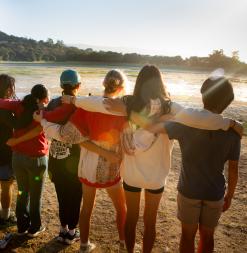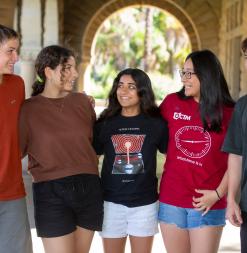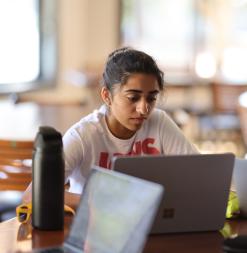Housing and Dining
Appliances and Cooking
Show
Hide
Curfew and Lights Out
Show
Hide
Dining Hall
Show
Hide
Furniture
Show
Hide
Indoor Sports & Recreational Activity
Show
Hide
Pets
Show
Hide
Screens and Windows
Show
Hide
Safety
Alcohol, Drugs, and Tobacco
Show
Hide
Prescriptions in labeled containers with the participants name and date of birth or over-the-counter medications that are approved for use by the participant’s parents or legal guardians are exempted from this policy.
Crosswalks
Show
Hide
Lanyards
Show
Hide
Pranks
Show
Hide
Safety Equipment and Fire Hazards
Show
Hide
Transportation
Show
Hide
Visitors
Show
Hide
Weapons
Show
Hide
Behavior
Attendance
Show
Hide
Cleanliness and Hygiene
Show
Hide
Electronics–Cell Phones, Laptops, and Tablets
Show
Hide
Entrepreneurial Activities and Solicitation
Show
Hide
Public Displays of Affection
Show
Hide
Privacy and Media Protection
Respecting Private Information
Show
Hide
Respecting Private Information
Expectations of Privacy
Show
Hide
Sharing Course Materials
Show
Hide
Visitors Temporarily Checking a Participant out of the Program
Pre-approved adults are welcome to check a participant out for a maximum of three hours. Check-outs are permitted only when they do not conflict with scheduled program activities. Parents/legal guardians are required to complete this online form for each check-out prior to the start of the program for approval by Stanford Pre-Collegiate Studies staff. Stanford Pre-Collegiate Studies will email parents/legal guardians notifying them if the check-out is approved. Stanford Pre-Collegiate Studies reserves the right to deny the request if there is a conflict.
- Participants may only be picked up by visitors who are registered as Approved Visitors in the CampDoc portal.
- Approved visitors must be 18 years of age or older and will be asked to show a photo ID when picking up the participant.
- Approved visitors may not enter the residence hall for any reason.
- Approved visitors are responsible for the safety and well-being of the participant while they are together.
Check-out Time
Pre-approved adults may check participants out for a maximum of three hours during unstructured time that does not conflict with program activities.
Responsibility
Participants must abide by program rules when outside of their residence hall.
Checking a Participant Out for an Emergency
If there is a family emergency or extenuating circumstance that would require a participant to temporarily leave the program without prior approval, the parent/legal guardian should contact Stanford Pre-Collegiate Studies staff via the emergency contact number to notify them and inform staff when the participant will be leaving and returning to the program.
During the phone call, the parent/legal guardian should include information on which approved visitor will be picking the participant up and where the participant will be traveling to. Program staff will work with the participant and their family to provide support before, during, and after the family emergency.
Attendance and Excused Absences
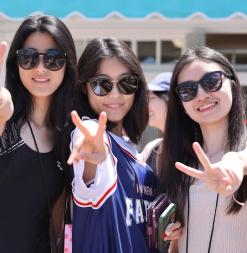
Participation in Program Activities
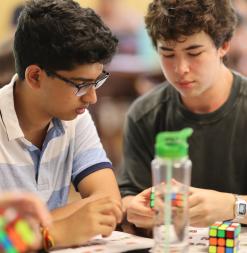
Commitment to the Program
Attendance Policy
Excused Absences
Participants should communicate directly with residential staff if they need to miss class for one of the permitted reasons (medical or religious). Communication should happen in advance of the absence whenever possible.
Parents/legal guardians should email spcs-residential@stanford.edu to make a request for a participant to miss class or activities for reasons outside of the above categories. We will review all requests and respond within one to two business days; approval of any request is not guaranteed.
Emergency Exceptions
Last-minute emergencies that require a participant to miss scheduled program activities will be prioritized when possible as requests are reviewed.
Program Completion
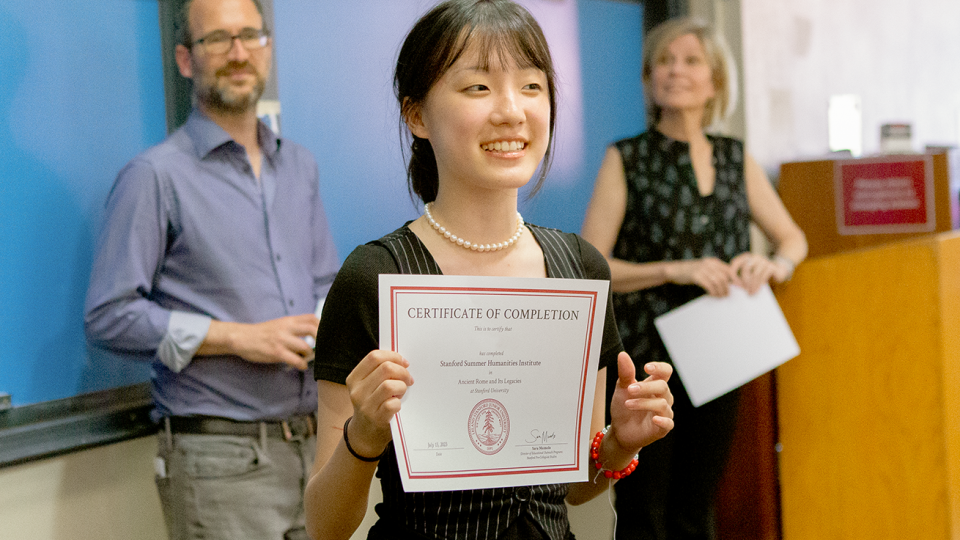
Participants who successfully complete the program will receive a Certificate of Completion.
We look forward to partnering with families of our participants to ensure holistic success in our program.
A positive and constructive working relationship between Stanford Pre-Collegiate Studies and the parent/legal guardian is essential to the fulfillment of the program’s mission. All parents/legal guardians are expected to support their participant throughout the duration of the program and help enforce the rules and code of conduct of Stanford Pre-Collegiate Studies. In addition, parents/legal guardians acknowledge and understand that sometimes it will be necessary for staff members to confidentially share information they provide with other staff members and with instructors on a "need to know" basis in order to address issues raised. We maintain a strict policy of no retaliation. The program reserves the right to suspend, terminate the enrollment of a student, or decline to re-enroll a student if the program concludes in its sole discretion that the actions of a parent/legal guardian interfere with the program’s mission in a manner that is disruptive to the operation of the program.
Guidelines for Parent/Legal Guardian Communications with Instructors and Staff
We welcome constructive communication between program staff, instructors, and families that benefits the success of participants. You can help us achieve our mutual goal of supporting your participant by:
- Reading all program communications in a timely manner and discussing the content with your participant regularly.
- Encouraging your participant to stay aware of communication for their specific course or from their residential staff, in a timely manner and to, after reading such communication thoroughly, contact their instructor or residential staff if they are unclear about an expectation.
- Encouraging your participant to communicate regularly with residential staff and instructors via the communication platforms outlined at the beginning of the program.
- Proactively contacting program staff via email at spcs-residential@stanford.edu if you or your participant have concerns, confusion, or difficulties about program policies and procedures.
- Asking your participant how their experience in the program is going and supporting them in problem solving any issues or concerns they have.
- Motivating your participant to advocate for their needs by talking directly with any residential staff member.
- Setting reasonable expectations regarding response times with communication, being mindful of Pacific Daylight Time business hours and the possibility that residential staff may be addressing a crisis situation and will have to prioritize which concerns they respond to first.
Additionally, parents/legal guardians should not partake in any of the following activities under any circumstance unless explicitly advised to do so by Stanford Pre-Collegiate Studies staff:
- Contact their participant’s instructor, TA, or residential counselor on the participant’s behalf.
- Contact another participant (example: roommate if there is a roommate conflict) on their participant’s behalf.
- Contact another participant’s parent/legal guardian to address a concern involving their participant.
- Contacting any campus office/department (with the exception of the Stanford Department of Public Safety) without first consulting with Stanford Pre-Collegiate Studies staff.
Canvas
Canvas is the Learning Management System used by Stanford, and will be your virtual workspace for all of your classroom needs. This is where you will access your course syllabus, submit assignments, connect with your classmates, and communicate with your instructor.
You will receive an invitation email from Canvas (notifications@instructure.com) with instructions to finish your Canvas registration. If the email has not arrived approximately one week before the start of your program, please wait a day and check again (make sure to also check your spam folder of the email used on your registration). After logging in for the first time, we recommend that you bookmark the Canvas page (https://spcs-programs.instructure.com) for quick access throughout the program. Your academic course will be published in Canvas shortly before the session begins.
Technology Support Resources
Once you have access to Canvas, you will see a course titled "SPCS Tech Page for Students" listed under courses. This course includes how-to articles and troubleshooting tips for technical issues you might encounter with the platforms used in the program. We encourage you to make this your go-to source for technical questions throughout the summer program.
Film and Video Waivers
During the course of your program, you may be exposed to rated R content in class or the night before in preparation for class. All rated R materials will be strictly for academic purposes and to enhance your learning. To the greatest extent possible, Stanford Pre-Collegiate Studies will send your parent/legal guardian a waiver to sign in advance that details the specific film(s) you will be watching.
If you are not provided permission to watch a specific film, you will be provided the opportunity to complete an alternative assignment. It is advised that you watch films or videos with your peers to inform classroom discussions.
Media Waiver: Photography and Video/Audio Recordings
Participation in the Stanford Pre-Collegiate Studies program constitutes an agreement by the participant and the participant’s parent(s) or guardian(s) to Stanford Pre-Collegiate Studies’ use and distribution (both now and in the future) of the participant’s image or voice in photographs, video, or audio capture, or electronic reproductions of such classes and other campus and program activities.
The Media Waiver below is incorporated in the Participant and Custodial Parent Indemnification and Hold Harmless Agreement, which is signed by participating students and their parents.
Participant and Custodial Parent agree to grant Stanford University permission to use participant’s name, photographic and/or videographic image and photographic and/or videographic images of Participant’s work product (research posters, final presentations, speaking engagements), if applicable, provided or captured as part of Stanford Pre-Collegiate Studies (SPCS) programs, or by SPCS, in any way, in all media now known or later invented for any educational, fundraising, promotional, publicity or other purposes worldwide and in perpetuity. Participant and Custodial Parent agrees that Stanford may record, edit, use, reproduce, publish and distribute by way of any and all media transmission, the visual and/or audio likeness of Participant and other commentaries, information, and materials the Participant may provide in connection with the Program, which includes, without limitation, Participant’s name, biographical information, recorded voice, likeness, commentaries, presentation materials, and/or performance at the Program. Participant and Custodial Parent understand that Stanford intends to make information about or images of Participant available on the Internet for public access and information, and hereby grant permission for such publication and use. Participant and Custodial Parent further grant permission to the photographer/videographer who captures any such image/footage described above to include the photograph or video in a portfolio (in any form in any media) of the photographer's/videographer's work. Participant and Custodial Parent release Stanford and Stanford's assigns and licensees from any claims that may arise regarding such specified use of Participant’s image and/or biographic information, including any claims of defamation, invasion of privacy, rights of publicity or copyright. Stanford is permitted, although not obligated, to include Participant’s name as a credit in connection with the image. Further, Participant and Custodial Parent understand and agree that Stanford is not obligated to utilize any of the rights granted in this Agreement.
Participant and Custodial Parent understand that any academic projects produced while participating in a Program may be used for publicity purposes and/or as a resource for prospective students. Participant and Custodial Parent agree that Stanford will be held harmless from any liability that may arise regarding the production, use, and distribution of such materials as described herein, and Stanford is hereby released from any claims relating to the rights granted above.
